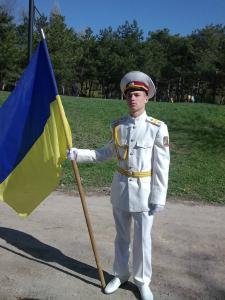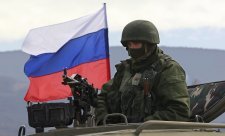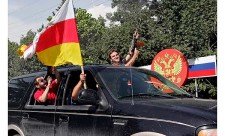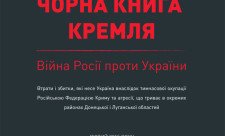It is easy to say – he died for Motherland. It is easy to say – he was a patriot […]. But what if – not for Motherland? But what if – he wasn’t?..
Sergey Onchurov came from Dzhankoy. He grew up in Crimea, believed in communism. He argued with a teacher of history defending pro-Russian views while studying in the Sevastopol military school. He took an oath of the Ukrainian army, did military service in Odessa. He died for Ukraine in the Donetsk region, having protected a soldier from Uragan (“Hurricane”) shrapnel. The correspondent of the online media “Pod pricelom” tried to find out what, apart from patriotism or ideology, can give a person a push to go to war.
Call sign: “Smerch”. Occupation – the military. Calling – a friend.
He was 22 years old and he could be 23. Sergey was born on April 25, 1992 in the Crimean town Dzhankoy. His mother wanted her son to become a cook, but his father was waiting for the Sergey’s decision. And so, he said that he would become the military a few years ago.
“I didn’t mind, because I wanted to be the military once as well but I couldn’t do that,’ the Sergey’s father Aleksandr Evgenievich, who is a moustached man in good shape seemingly about 50 years of age, tells us. ‘His mom wanted him to become a cook and he seemed to agree first, but then wanted to study in the Alushta military lyceum. And when the medical board in Alushta found that he was flat-footed and refused entering, I thought that it was over, he didn’t entered, and went to the bus station to buy tickets. When I came back – his face was in tears. He said that he wanted to become the military. I told him then: “If you want – you will be the military.” I arranged for him to pass exams in a single day, we went, saw another medical board that showed he had no flat feet. And he entered.”
His father says that Sergey was a real soldier in his nature, and had an appropriate call sign – “Smerch”. And the senior lieutenant of the 28th separate mechanized brigade was reputed to be rather a friend than a commander among subordinates. One of the Sergey’s subordinates Petr Melnichuk remembers how the lieutenant arrived to Odessa for the first time being placed from Crimea:
‘Two young inexperienced officers were sent to our company in August 2013, when we were on the Nikolaev training ground. Honestly speaking, from the first days I liked Sergey less than another officer Maksim. He was so… well, very kind. He was like not a chief but rather a friend. But he helped us very much. He treated his platoon humanly as a true brother in arms. I remember when I drank a lot on my birthday and could be chewed out because we had severe rules regarding that. But Sergey, as we say, covered up for me in front of the top brass. I have no idea what he has invented but he helped me.’
A large oath and a little man
‘I didn’t know that Sergey was in the front line. He didn’t tell us about that. He said that he was at checkpoints near Odessa,’ Aleksandr Evgenievich says. ‘On August 22, a commander called and said that it was over. We were shocked. But you know, I think that even if I knew where my son was and went to take him, he wouldn’t leave.’
The senior lieutenant’s mom Larisa Viktorovna Onchurova says that at the beginning of his study in Alushta Sergey often said that he would try to go to the Russian army after graduation. But when he was a 3rd year student, he stopped saying that. When he was asked, he answered that the oath couldn’t be taken twice.
‘And when it all started in Crimea (the events of March 2014 – Editor’s note), he had the opportunity to leave military service because his wife got the Russian passport and was allegedly already the Russian citizen. He said that he sent in resignation, but then said that it wasn’t signed. Although, may be, he didn’t send anything but just told us about that. With a goal to set our mind at rest,’ his father says.
After March 16, parents asked Sergey Onchurov to come back from Odessa, where he served being placed after the military school, to Dzhankoy. His colleagues also offered him – the border is close, they say, and it is possible to safely leave and nobody will keep. But the lieutenant couldn’t desert the oath.
‘I won’t be a deserter,’ he said to his father at that time.
“He struck me down to the ground, then held his neck and began to wheeze”
The 28th separate mechanized brigade was sent to the ATO area without prior warning. They were said that they were going to the military exercises prior to leaving.
‘No one knew where we were going. When we arrived at the place, there we realized that we were in the Donetsk region,’ the Onchurov’s colleague Aleksandr Fedosiev says. ‘It was on June 20.’
In Donbass Sergey shared with his soldiers that he wanted to go home to Crimea. However, as Aleksandr says, military duty and his combat soldiers held him.
He couldn’t leave us. In fact, he fought there for us.
On the morning of August 20, 2014 Sergey Onchurov’s platoon was located near the village Amvrosievka, but after some time mortar firing was started at the checkpoint. The company stayed in the position till half past five in the evening, until they received an order to retreat from there. Soldiers lined up the motor convoy, packed up and relocated to the wooded area not far from Zhukova Balka. We reached it in the dark, but it took a few minutes when this wooded area was shelled.
Everybody alighted from the car and the APC driver Aleksandr Fedosiev went on the road using headlights in order to persuade the enemy that the whole column retreated. Aleksandr stopped near the village Kuteynikovo, when he heard shots from the front that could mean we were encircled. Meanwhile, the rest of materiel reached him without headlights.
Having reached the village, Sergey Onchurov and the company commander began to decide what to do next. Sergey offered to split into several groups and go to the village till morning but the company commander didn’t support this idea. Then the convoy went to the wooded area near Kuteynikovo to stay the night.
‘Sergey sat on the driver’s seat to sleep, a sergeant sat next to him, and I slept on the car, on the top of armored car,’ Fedosiev says. ‘We were straddled at the first ‘Uragan’ salvo at five in the morning, about two hundred meters from us. All of us awakened with explosions. The second salvo hit next to us, in about five meters. And the third salvo – everything fell one and a half meters from us. So, he (Sergey Onchurov – Editor’s note) jumped on me, protected me by himself, then held his neck, wheezed. He rapidly took off running toward the explosions. The sergeant struck him down to the ground, we put him on stretchers but didn’t have time even to take him to the car, and he died. He had wounds to the neck and lung. We left this place on foot and went to a plant. In an hour, we took the APC, “Tabletka” (UAZ-452, military ambulance car – Editor’s note), and then we took the body. ’
Decoration for heroism
Sergey Onchurov should be put forward for the Order of Bohdan Khmelnytsky after the successful operation in the Donetsk region on August 20, 2014. But the lieutenant didn’t break out from the encirclement on August 21. According to Aleksandr Fedosiev, at that time the colonel Andrey Voylokov spoke about submitting of Onchurov to the Hero of Ukraine title.
Unfortunately, as of today, Sergey is absent in the lists of honours. Our editorial staff still hopes that Sergey Onchurov will be awarded by rights and promoted to the title.















